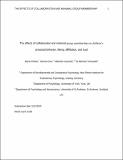The effects of collaboration and minimal-group membership on children's prosocial behavior, liking, affiliation, and trust
Abstract
Recent theoretical work has highlighted potential links between interpersonal collaboration and group membership in the evolution of human sociality. Here we compared the effects of collaboration and minimal-group membership on young children's prosocial behavior (i.e., helping and resource allocation), liking, affiliation, and trust. In a design that matched as closely as possible these two ways of connecting with others, we showed that 5-year-olds' behavior was affected similarly by collaboration and minimal-group membership; both increased children's preference for their partners on multiple dimensions and produced overall effects of a similar magnitude. In contrast, 3.5-year-olds did not have a strong preference for either collaborators or minimal in-group members. Thus, both collaboration and minimal-group membership are similarly effective in their influence on children's prosocial behavior and social preferences.
Citation
Plötner , M , Over , H , Carpenter , M & Tomasello , M 2015 , ' The effects of collaboration and minimal-group membership on children's prosocial behavior, liking, affiliation, and trust ' , Journal of Experimental Child Psychology , vol. 139 , pp. 161-173 . https://doi.org/10.1016/j.jecp.2015.05.008
Publication
Journal of Experimental Child Psychology
Status
Peer reviewed
ISSN
0022-0965Type
Journal article
Description
The authors thank the Economic and Social Research Council–United Kingdom (ESRC) for supporting H. Over (Grant ES/K006702/1)Collections
Items in the St Andrews Research Repository are protected by copyright, with all rights reserved, unless otherwise indicated.

